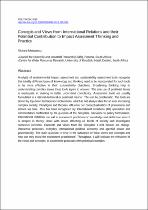 ResearchSpace
ResearchSpace
Concepts and views from international relations and their potential contribution to impact assessment thinking and practice
JavaScript is disabled for your browser. Some features of this site may not work without it.
- ResearchSpace
- →
- Research Publications/Outputs
- →
- Journal Articles
- →
- View Item
| dc.contributor.author |
Meissner, Richard

|
|
| dc.date.accessioned | 2016-11-29T11:57:33Z | |
| dc.date.available | 2016-11-29T11:57:33Z | |
| dc.date.issued | 2016-07 | |
| dc.identifier.citation | Meissner, R. 2016. Concepts and views from international relations and their potential contribution to impact assessment thinking and practice. Politikon, 43(3), 411-427 | en_US |
| dc.identifier.issn | 0258-9346 | |
| dc.identifier.uri | http://www.tandfonline.com/doi/pdf/10.1080/02589346.2016.1212529 | |
| dc.identifier.uri | http://hdl.handle.net/10204/8875 | |
| dc.description | Copyright: 2016 Taylor & Francis. Due to copyright restrictions, the attached PDF file only contains the abstract of the full text item. For access to the full text item, please consult the publisher's website. The definitive version of the work is published in Politikon, 43(3), 411–427 | en_US |
| dc.description.abstract | Analysts of environmental impact assessment and sustainability assessment tools recognise that ideally different types of knowledge and thinking need to be incorporated for such tools to be more effective in their sustainability objectives. Broadening thinking help to understanding complex issues these tools aspire to uncover. The sole use of positivist lenses is inadequate in seeking to better understand complexity. Assessment tools are usually formulated in a rational-technical or positivist manner. This can be problematic. The tools are driven by top-down technocratic motivations, which is not always ideal for an ever increasing complex society. Paradigms and theories influence our conceptualisation of phenomena and actions we take. This has been recognised by International Relations (IR) specialists and commentators confronted by the question of the discipline, relevance to policy formulation. International Relations can add to assessment practitioners’ knowledge and skills base since it is steeped in theory, deals with issues affecting all levels of society and investigates numerous concerns. Concepts and views from the discipline I will discuss are change, interactive processes, everyday international political economy and agential power and governability. The main question is what is the substance of these views and concepts and how can they assist the assessment practitioner? Throughout, I will indicate the relevance of the views and concepts, to assessment processes with practical examples. | en_US |
| dc.language.iso | en | en_US |
| dc.publisher | Taylor&Francis | en_US |
| dc.relation.ispartofseries | Workflow;17446 | |
| dc.subject | Environmental impact assessment | en_US |
| dc.subject | Sustainability assessment tools | en_US |
| dc.title | Concepts and views from international relations and their potential contribution to impact assessment thinking and practice | en_US |
| dc.type | Article | en_US |
| dc.identifier.apacitation | Meissner, R. (2016). Concepts and views from international relations and their potential contribution to impact assessment thinking and practice. http://hdl.handle.net/10204/8875 | en_ZA |
| dc.identifier.chicagocitation | Meissner, Richard "Concepts and views from international relations and their potential contribution to impact assessment thinking and practice." (2016) http://hdl.handle.net/10204/8875 | en_ZA |
| dc.identifier.vancouvercitation | Meissner R. Concepts and views from international relations and their potential contribution to impact assessment thinking and practice. 2016; http://hdl.handle.net/10204/8875. | en_ZA |
| dc.identifier.ris | TY - Article AU - Meissner, Richard AB - Analysts of environmental impact assessment and sustainability assessment tools recognise that ideally different types of knowledge and thinking need to be incorporated for such tools to be more effective in their sustainability objectives. Broadening thinking help to understanding complex issues these tools aspire to uncover. The sole use of positivist lenses is inadequate in seeking to better understand complexity. Assessment tools are usually formulated in a rational-technical or positivist manner. This can be problematic. The tools are driven by top-down technocratic motivations, which is not always ideal for an ever increasing complex society. Paradigms and theories influence our conceptualisation of phenomena and actions we take. This has been recognised by International Relations (IR) specialists and commentators confronted by the question of the discipline, relevance to policy formulation. International Relations can add to assessment practitioners’ knowledge and skills base since it is steeped in theory, deals with issues affecting all levels of society and investigates numerous concerns. Concepts and views from the discipline I will discuss are change, interactive processes, everyday international political economy and agential power and governability. The main question is what is the substance of these views and concepts and how can they assist the assessment practitioner? Throughout, I will indicate the relevance of the views and concepts, to assessment processes with practical examples. DA - 2016-07 DB - ResearchSpace DP - CSIR KW - Environmental impact assessment KW - Sustainability assessment tools LK - https://researchspace.csir.co.za PY - 2016 SM - 0258-9346 T1 - Concepts and views from international relations and their potential contribution to impact assessment thinking and practice TI - Concepts and views from international relations and their potential contribution to impact assessment thinking and practice UR - http://hdl.handle.net/10204/8875 ER - | en_ZA |





